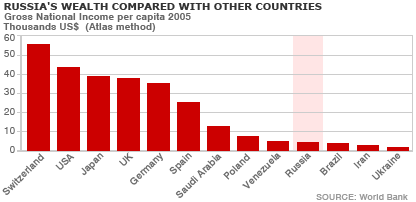The End of "Democracy"?
Filed under: Eastern Europe
On October 11th the Economist magazine published an editorial entitled "The End of Democracy?" which asserts that our present lexicon is inadequate to describe our current international political systems, especially the terms "western" and "democratic," and seeks to offer suggestions for revisions. The column, written by the magazine's former Russia correspondent Edward Lucas, states:
It is much easier to nitpick than to invent. But here are some attempts. First, ban the word "democracy", which has been worn smooth by misuse. If Vladimir Putin of Russia describes himself as a "perfect democrat", he is welcome to the term, along with the Democratic People's Republic of Korea and those nostalgic for the German "Democratic" Republic. Democracy all too often means buying votes, rigging elections and mob rule. Three better terms are "law-governed", "free" and "public-spirited." The first means that the executive power is subject to an abstract code of rules, enforced by fearless outsiders: in other words, even the president can be impeached. That is the basis for private property, solid contracts and enforceable civic rights. "Free" is a bit broader. It means countries where you can complain, singly, jointly or en masse, about things you don't like, without fear of retribution from your targets. You can write to or set up a newspaper, join or found a pressure group. "Public-spiritedness" is the most important: it embodies the idea that personal gain and family ties do not reign supreme, and that harsh patriotic sentiment is not the only abstract identity that deserves loyalty. It is public-spiritedness that creates strong institutions, both public and voluntary. It makes societies self-critical and self-correcting, and life for everyone becomes safer, nicer and more efficient. A good shorthand term for the free, law-governed and public-spirited countries of the world is badly needed, to replace the misleading and off-putting "West", with its echoes of colonialism, self-satisfaction and cultural supremacism.
The Economist implies that we should adopt the terms "open" and closed" to distinguish a country like Russia from one like America. Then it warns:
Better terminology means clearer thinking, but it does not guarantee victory. Nearly 20 years on, the gains of the heady and happy late 1980s are looking troublingly fragile and temporary. Closed societies are riding high; open ones are rattled and demoralised. Rather than asking when the values of "open Europe" will finally triumph, it might be better to ponder if they will survive.
The Economist is a provocation by nature, not a recitation or an argument. It knows full well, of course, all about the horrific suffering currently being endured by people who "live" in Russia, China, North Korea, Syria, Iran, Venezuela and the like.

It knows perfectly well that societies of that kind have imploded (the USSR) or been destroyed (Nazi Germany) many times in the past, while the economies of today's open societies are surging as never before, welcoming a whole new era of prosperity and development (the Dow Jones recently surged to a breathtaking new historic high).
But the provocation is still welcome. It's unquestionably true that the people of the open societies are not doing enough to protect and nurture their values -- the pathetic levels of voter turnout at American elections, and the failure to adopt simple reforms like weekend voting, online registration, and instant runoff balloting are obvious examples. Still more troubling, the open societies have not been aggressive enough in facing the threats now being posed to them by the closed societies, despite the historical lessons they have been taught about the consequences of such inaction. We may well need a new language to discuss new problems, even as they echo the past, and even if we don't we certainly need to think up new strategies to fight a new cold war. Words are a good starting place, and thoughts can lead to actions.
The closed societies cannot defeat us unless we allow them. We have met the enemy and it is us.






